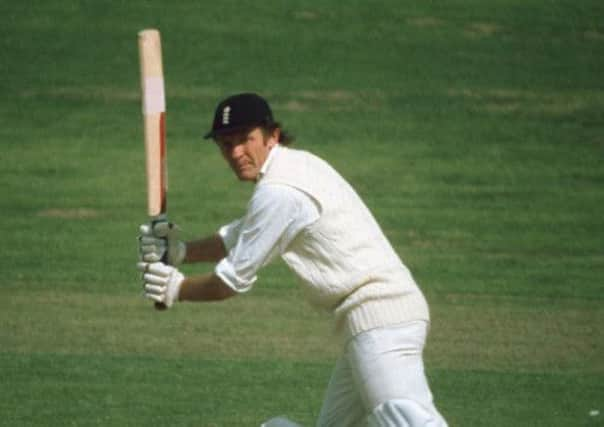Mike Denness: Scot who captained England dies


He is not the only Scot to have led England – Douglas Jardine and Tony Greig had Scottish parentage – but Denness learned the game in Scotland.
He was born in Bellshill like Sir Matt Busby, as Wisden observed when Denness was one of the Almanack’s Five Cricketers of the Year, but the family moved to Ayr when he was a small boy. He was educated at Ayr Academy where he was in the same rugby XV as Iain McLauchlan. Denness played fly-half, and McLauchlan has opined he was good enough to have gone on to play for Scotland. Cricket, however, was his preferred sport, and he was picked for the Scotland XI while still at school. In 1974 Ayr Academy could boast that the current captain of the Scotland rugby XV and current captain of the England cricket XI were both former pupils; surely a unique record.
Advertisement
Hide AdAdvertisement
Hide AdIt was clear to the Ayr club coach, Charlie Oakes, a former Sussex player, that the young Denness had the ability to play at first-class level. Someone had a word in the ear of EW (Jim) Swanton, the Daily Telegraph cricket correspondent and a man of great influence in the upper reaches of the game, when he came to speak at the Ayr club dinner. Swanton invited Denness to play for his own touring club team, The Arabs, and then recommended him to Kent. He soon established himself there as a free-scoring bat, sufficiently elegant to lose little in comparison with his county captain, Colin Cowdrey. Denness had all the strokes , but was especially strong on the offside.
The next step was harder. England had a strong batting line-up in the late Sixties with Geoffrey Boycott, John Edrich, Tom Graveney, Ken Barrington and Cowdrey to the fore, and Dennis Amiss and Brian Luckhurst, another Kent player, challenging for places. So it isn’t surprising that Denness was almost 30 when he was first picked in 1969. He was in and out of the team, but when Ray Illingworth lost the captaincy, Denness, by now captaining Kent successfully, became a candidate for the role. The appointment was however controversial, partly because many thought he wasn’t quite Test calibre, and partly because the selectors had overlooked Boycott who was unquestionably the greater batsman. Boycott himself felt aggrieved, and, though he played under Denness on the West Indian tour, made his displeasure felt.
Nevertheless that tour might be accounted a success. The series was drawn, though Denness contributed little with the bat. He retained the captaincy against India in the summer, scoring two hundreds and winning the series. There was therefore no surprise when he was invited to lead the team to Australia in the winter.
It would prove an unhappy tour, for two reasons. First, Boycott absented himself, sulking like Achilles in his tent (or like Ted Heath when dislodged by Margaret Thatcher). So Denness toured without his best batsman. Second, he was faced with the most formidable Australian fast-bowling attack since Bradman’s 1948 “Invincibles”. Dennis Lillee and Jeff Thomson were both terrifyingly fast, threatening physical danger in these pre-helmet days; and they were backed up by the very accomplished Max Walker. Third, Denness himself lost form, so much so that he dropped himself for the fourth Test of the six-Test series. He returned for the fifth, in which he hit 51 in the first innings and the sixth in which he came good with a big century, 188, then the highest score by an England captain in a Test in Australia. But even this magnificent innings was devalued in the eyes of his critics because Thomson was unfit to play, and Lillee broke down injured after half-a-dozen overs. Denness hit his fourth and last Test century when the team went on to New Zealand, but the following summer he was abruptly, and probably unfairly, sacked when the first Test of the return Ashes series was lost. His critics may have been right in thinking that, judged by the highest standards, he wasn’t Test class. Nevertheless his Test average, a few decimal points under 40, is pretty good, better indeed than that of several other batsmen who have captained England before or since. They were probably right in saying he was unconvincing against really fast bowling, but again that might be said of most players; and Edrich and Amiss also failed on that tour against Lillee and Thomson.
There is a good case for saying that Denness was hard done by. He was certainly a very good county player, for Kent and later Essex, scoring more than 25,000 first-class runs with 33 centuries, while also being successful in the one-day game. In full flow there were few more attractive batsmen of his time to watch, and he was also an outstanding fielder, especially in the covers. Finally, if his record as a Test captain is chequered, one would have to say that he was dealt a poorer hand than others have been, and faced stiffer opposition than most. He was, moreover, a very successful county captain, leading Kent to several one-day titles.